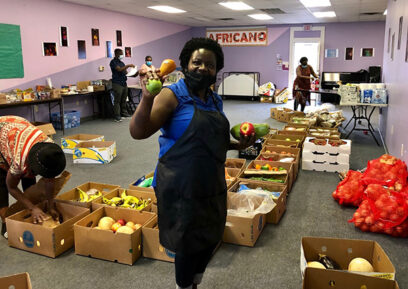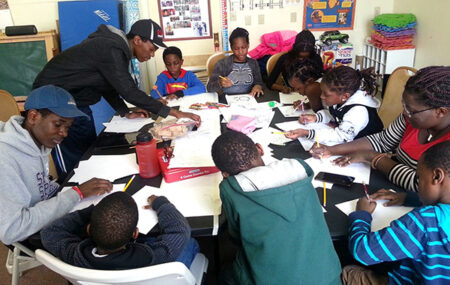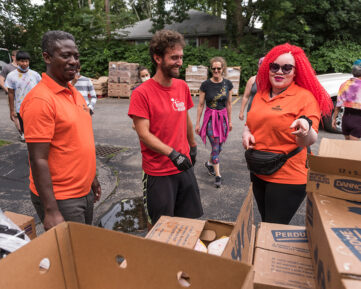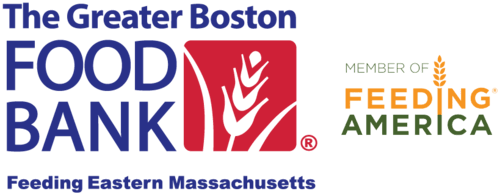Food for Little Kampala: Nourishing the Ugandan Community of Waltham
Working alongside partner agencies like Healthy Waltham and utilizing a strong network of support, The Greater Boston Food Bank (GBFB) expands its reach into diverse communities.
 Waltham is a center for Ugandan culture. Starting in the 1960s, when President John F. Kennedy created scholarships for African students, Ugandans began attending universities in Greater Boston. Now, thousands of Ugandans call Waltham home, many nicknaming it “Little Kampala”, Kampala is the capital of Uganda.
Waltham is a center for Ugandan culture. Starting in the 1960s, when President John F. Kennedy created scholarships for African students, Ugandans began attending universities in Greater Boston. Now, thousands of Ugandans call Waltham home, many nicknaming it “Little Kampala”, Kampala is the capital of Uganda.
The city contains many Ugandan eateries, such as Karibu Restaurant, as well as many Ugandan businesses, religious organizations, and nonprofit organizations, including Radio Uganda Boston, Pearl of Africa Store, St. Peter’s Church of Uganda Boston, the Uganda Boston Community Association, and African Cultural Services, Inc. – also known as Africano Waltham.
Africano Waltham, run by Founder, CEO, and President Juliet Najjumba, was established as a welcoming place for Ugandan youth and families as they learned to adapt to life in the US while remaining true to their African roots.
“The system can be intimidating for parents, especially if there is a language barrier.” Juliet begins, “And then there’s the balance of adjusting to American culture while remaining prideful about Ugandan culture. It’s very important for the Ugandan youth of Waltham to have self-confidence and an enriching journey as they grow.”

Africano Waltham began with a couple of young kids, an idea, and a large 15-person van. Juliet created a schedule to ensure an engaging curriculum including weekly homework help sessions, African dance and drum lessons, performances, and group field trips to museums in Boston. Over the past ten years, Africano Waltham has become a staple for Ugandan children to thrive.
But when COVID-19 hit, the organization and the Ugandan community were both thrown into turmoil.
Food insecurity is an issue disproportionately impacting communities of color already, and COVID-19 has only exacerbated those inequities. Many individuals lost jobs, had work hours reduced, or had to continue working in essential industries while kids stayed home alone.
Working alongside Healthy Waltham, one of GBFB’s partner agencies, Africano Waltham immediately shifted focus to meet the need and doubled the number of families they served. By December 2020, they were working with over 100 African families in the Waltham community.
Juliet explains, “Ugandan people are very private. They want to know who is knocking on their door. And like many individuals experiencing food insecurity, they don’t want to show their need, they don’t want to ask for help. They want to work hard and provide for their families …. But sometimes working hard isn’t enough.”
Myriam Michel, Executive Director of Healthy Waltham, shares, “Partnerships like the one we have with Africano Waltham are extremely effective at meeting the need because they know their clients and can build trust. They can reach people that need help that otherwise we wouldn’t know about.”
Over the past year, Healthy Waltham shifted from 400 families being served pre-pandemic to over 1,000 families in just a couple of months. The plus side has been a community of volunteers and partners ready to help.

“We currently have 60-70,000 pounds of food delivered and distributed on the same day. Gaining a large volunteer network has been a real silver-lining of the pandemic.” Maria, Operations Director of Healthy Waltham, shares, “Many are bilingual and able to support the different communities of Waltham with languages such as Mandarin, Spanish, and Haitian-Creole.”
In addition to a network of volunteers, Healthy Waltham quickly partnered with community members to implement alternate models where they can bring food out into neighborhoods that can’t travel into the pantry – such as Africano Waltham.
Juliet shares with a smile, “Every week, we pack two cars full of deliveries and begin making our rounds. It’s an incredible feeling, really, to be able to greet the families – the grandmas, the children – and give them what they need.”
Working with Healthy Waltham staff, Africano Waltham staff picks up alongside several other partners in the area, also ensuring opportunities for culturally appropriate food to be included.
Juliet explains, “We appreciate the wide variety of fresh, healthy foods and staples that the Greater Boston Food Bank provides, such as chicken, milk, eggs, produce including fruits and fresh vegetables, and beans and rice. Thanks to this support, we’ve been able to purchase additional food our community recognizes and loves, like green plantain, yellow plantain, cassava, groundnuts, and fish, such as tilapia – so many important things to the Ugandan diet and way of life.”
“All of the community has made this possible. It really takes a village to raise a child, and thanks to the support of Healthy Waltham and The Greater Boston Food Bank, we have an incredible village of support for the Ugandan community in Waltham.”
Juliet expresses, “We used to worry – we used to be so afraid that we could not support each other. But now… we’re rich, we’re rich with opportunity. Every day we wake up – and we always have enough.”
